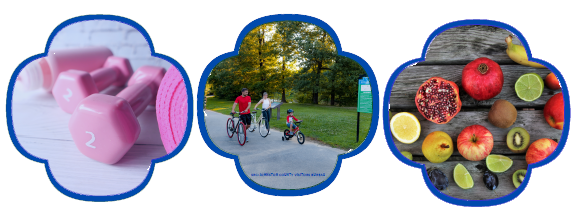
DPP (Diabetes Prevention Program) is a CDC recognized program designed to help prevent or delay type-2 diabetes. Through a year long program you will learn healthy habits such as increasing physical activity, eating healthier, and reducing stress.
This year-long program includes:
16 Weekly Classes
6 Monthly Classes
Healthy Eating
Physical Activity
Tools and Encouragement
Group Setting
New Cohort Begins:
January 8th, 2025 from 11AM to 12 Noon
Johnston County Public Health Dept
517 N. Brightleaf Blvd, Smithfield
1/8/2025: Introduction
1/15/2025: Get Active to Prevent T2 *accepting new participants until this class.
1/22/2025: Track your Activity
1/29/2025: Eat Well to Prevent T2
2/5/2025: Track your Food
2/12/2025: Get More Active
2/19/2025: Burn More Calories than you take in
2/26/2025: Shop and Cook to Prevent T2
3/5/2025: Manage Stress
3/12/2025: Find Time for Fitness
3/19/2025: Cope with Triggers
3/26/2025: Keep your Heart Healthy
4/2/2025: Take Charge of your Thoughts
4/9/2025: Get Support
4/16/2025: Eat Well Away from Home
4/23/2025: Stay Motivated to Prevent T2
5/21/2025: When Weight Loss Stalls
6/18/2025: Stay Active to Prevent T2
7/16/2025: Stay Active Away from Home
8/20/2025: Have Healthy Food you Enjoy
9/17/2025: More about Carbs
10/15/2025: Get Back on Track/Prevent T2 for Life
If you have any questions about the program, please contact:
Mary Banks, BS, CHES® Public Health Education Specialist
mary.banks@johnstonnc.gov
919-989-5200
Take the Prediabetes Risk Test Today!
https://www.cdc.gov/prediabetes/risktest/index.html
Referral Form:
johnstonnc.com/files/health/DPP-Provider-Packet.pdf
According to the American Diabetes Association (ADA), diabetes is a chronic disease that affects more than 18 million people in the United States. Self management education is critical to the medical care of the diabetic. To address this issue, the NC Division of Public Health has developed a recognized “umbrella” program with the ADA to provide self-management diabetes education in local health departments. ADA recognized programs can bill Medicaid, Medicare and have a sliding scale fee for self pay clients. North Carolina is the only state to provide an umbrella program.
The Diabetes Umbrella Education Program includes the following curriculum: disease process, diet, exercise, medication review and education, foot care, acute and chronic complications, mental health adjustments. Clients are required to set and sign patient centered goals for their diabetic condition at every encounter. The staff will measure their success and barriers at each assessment or class. On average the clients that have completed the Umbrella Program will have a decrease in their Hgb A1C by at least one point, weight reduction and are monitoring their blood glucose level independently on a regular basis.
We welcome clients to the Johnston County Diabetes Umbrella Program. However, to participate, you must be referred. ADA-recognized programs can bill Medicaid, Medicare and have a sliding fee for self pay clients. This program allows Private Providers in the County to refer their patients for Diabetic education which includes the following:
Clients are required to set and sign patient-centered goals for their diabetic condition with each encounter.
Referrals to the Johnston County Diabetes Umbrella Program (DERP)
We welcome clients to the Johnston County Diabetes Umbrella Program. The JCHD Umbrella Program Physician Referral Forms are linked below. Your referral along with copies of the clients most recent lab values can be faxed to 919-989-5279.
Our goal is to provide the highest possible care for our clients.
Page last updated on: January 31, 2025